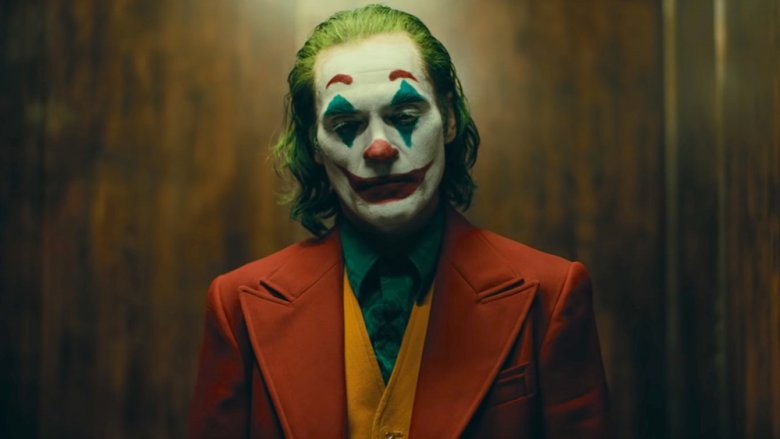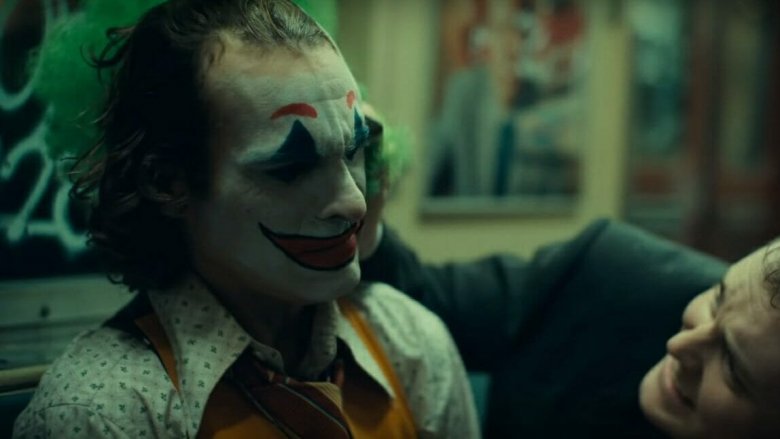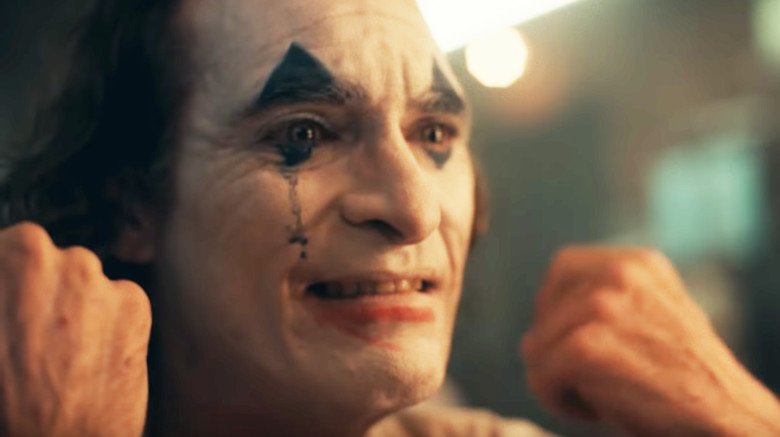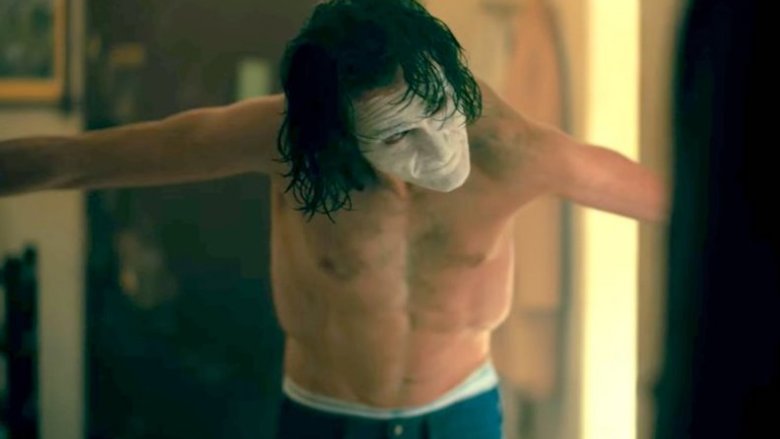Aurora Shooting Victims' Families Are Concerned About Joker
Team Warner Bros. is primed to put their happy faces on when Todd Phillips' and Joaquin Phoenix's Joker hits theaters in a couple of weeks, and many insiders believe the gritty, character-driven take on the iconic Batman villain is already on the path to both box-office and awards season glory. As this darker-than-dark version of the Clown Prince of Crime is set to wreak havoc on the streets of the fictional municipality of Gotham, a concerned group of people are hoping that history doesn't repeat itself here in the real world.
They are the family members of the Batman fans whose lives were violently taken in a 2012 mass shooting in Aurora, Colorado, which occurred in a movie theater during a screening of Christopher Nolan's trilogy-capping The Dark Knight Rises. Per The Hollywood Reporter, several victims' family members have penned a letter to Warner Bros. brass voicing their concerns about Joker, and imploring the studio to "be a part of the growing chorus of corporate leaders who understand that they have a social responsibility to keep us all safe."
Warner Bros. has since responded by claiming that Joker, nor the filmmakers behind it, have any intent "to hold this character up as a hero." The statement further offers condolences to anyone effected by gun violence.
Additionally, the theater at which the massacre took place, the Cinemark Aurora, has announced it will not be screening Joker.
Fear of different kind of Dark Knight rising
Hard as it is to fathom, only seven years have passed since the July 20, 2012 Aurora shooting, perpetrated by James Holmes who walked into a screening of The Dark Knight Rises in full tactical armor, carrying an assault rifle and several other small arms, killing 12 people and injuring 70 more.
Though Warner Bros. hasn't shied away from revisiting the world of Batman in the wake of Aurora, featuring Ben Affleck's iteration of the character in Batman v Superman and Justice League, it's worth noting that the studio hasn't delivered a standalone Batman movie since the tragedy in 2012. Robert Pattinson's upcoming The Batman will eventually change that narrative, but Phoenix's heavy-hitting Joker may well be setting the bar for the cinematic world of Gotham to come — and that's sparking worries given how violent and twisted the film is.
With many critics already noting Joker's relentlessly bleak tone and penchant for hyper-realistic violence, the families of those lost in Aurora are concerned (and understandably so) that the studio behind The Batman may have too short a memory regarding The Dark Knight Rises' tragically complicated legacy — not to mention the horrific legacy of the man who perpetuated said tragedy — and may not be thinking fully about what kind of message a man like Joaquin Phoenix's failed-comedian-turned-crazed-killer Arthur Fleck could send to audiences.
The fear over Joker isn't completely unfounded
While the Joker didn't actually appear in The Dark Knight Rises, the weight of Heath Ledger's iconic turn as the bullet-and-gasoline-loving villain in Nolan's The Dark Knight was certainly still felt in the follow-up film. It remains to be seen just how much of an impact the Joker had on James Holmes' psyche, but Aurora's then-chief of police Daniel Oates has since offered his own take on the tragedy, arguing that on-screen violence does encourage real-life acts of violence.
"Every time there is a mass shooting or, in the collective media culture, a portrayal of a mass shooting or an evil character who engages in the wanton, random, senseless killing of innocents, we are all traumatized again," said Oates (via The Hollywood Reporter). He did, however, dispel the rumors that Holmes identified himself as "the Joker" as he was being arrested.
Sandy Phillips, one of the letter's signees who lost his daughter Lonnie in the shooting, expanded on those thoughts and reframed them in the specific context of the Joker himself: "For me, it's the gratuitous violence that this film glorifies and elevates with the Joker character."
It's hard to argue there was a dangerous sort of rockstar quality assigned to the anarchic version of the Joker presented in The Dark Knight. While most of us still aren't exactly sure which way Phillips and Phoenix have spun their clownish criminal in Joker, since the film doesn't hit theaters until October 4, it certainly appears this version depicts the character as a man cast aside by society before violently lashing out at the world that has wronged him. That parallel will certainly feel too close to home for folks who lost loved ones to the Aurora shooter — a fact openly addressed in the letter, which states that Holmes himself was "a socially isolated individual who felt 'wronged' by society."
What Todd Phillips and Joaquin Phoenix think of Joker's violence
The parallels between the villainous character and the real-life Aurora shooter are hard to overlook, but this does raise the age-old question of whether art is actually imitating life, or vice versa. Most likely, it's a case of equal parts of both, which leads one to ask exactly how much responsibility artists have regarding the impact their work may or may not have on society at large. With its uncanny ability to act as a mirror for society, cinema in particular carries a heavy load in this conversation.
Though most people are quick to acknowledge the healing powers of movies, many still believe it can also have the opposite effect. For their part, Phoenix and Phillips seem to believe that Joker won't inspire anyone to emulate the titular character.
Phoenix actually walked out of a recent interview with The Telegraph after being asked about the possibility of his Joker inspiring copy-cats, though he later rebounded by telling IGN, "Well, I think that, for most of us, you're able to tell the difference between right and wrong. So I don't think it's the responsibility of a filmmaker to teach the audience morality or the difference between right or wrong. I mean, to me, I think that that's obvious."
During the same chat with IGN, Phillips offered his own views on the matter: "The movie makes statements about a lack of love, childhood trauma, lack of compassion in the world. I think people can handle that message."
The director went on to say, "It's so, to me, bizarre when people say, 'Oh, well I could handle it. But imagine if you can't.' It's making judgments for other people and I don't even want to bring up the movies in the past that they've said this about because it's shocking and embarrassing when you go, oh my God, Do the Right Thing, they said that about [that movie, too]."
Of course, only time will tell what sort of legacy Joker will ultimately earn. Still, it's nice to know that — at the very least — the film will continue to stir conversations that society on the whole must continue to be open to. If you want to take part in that ongoing Joker conversation, you'll have your chance when the film opens in theaters on October 4.



